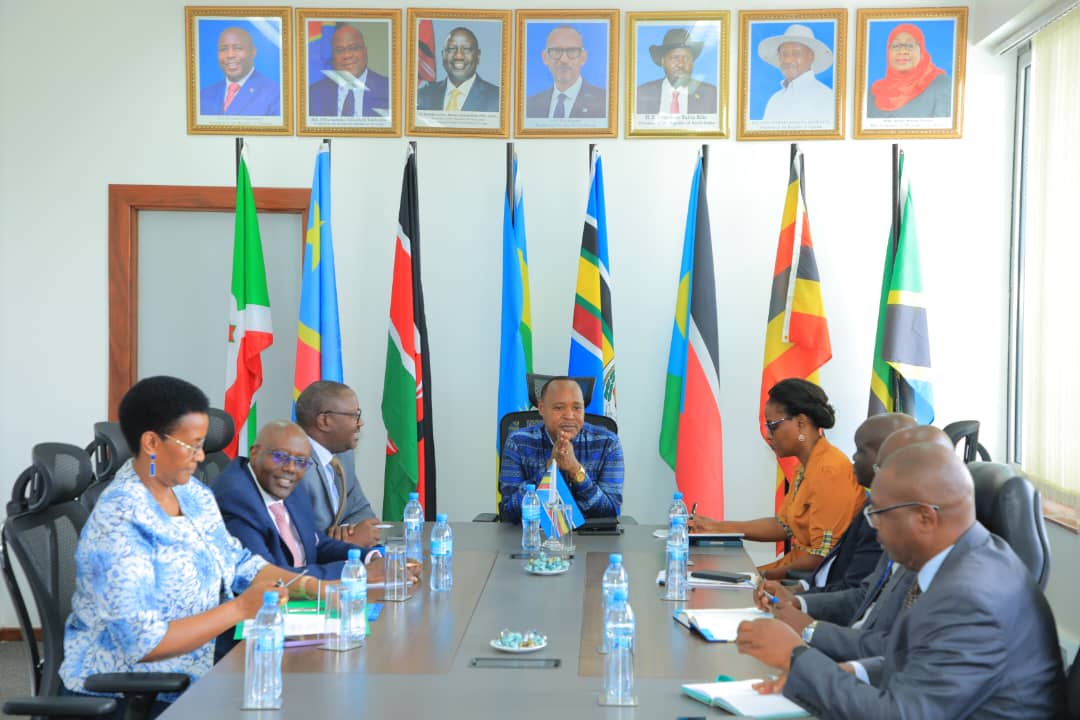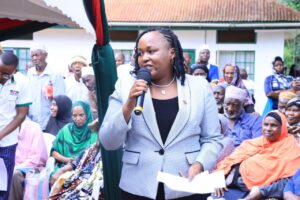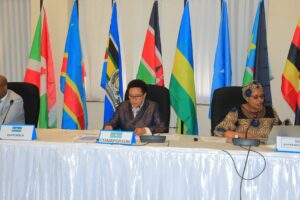
A new EAC Secretary-General and a set of Familiar Challenges, Opportunities
By Musila Muoki
Change of Guard
The rotation of the position of the Secretary-General to the East Africa Community is currently in the Republic of Kenya. While Kenya’s indecision has complicated the succession journey, the regional bloc is set to have a new Kenyan SC following the exit of Peter Mathuki, who has since been vetted as an Ambassador to the Russian Federation. In late March 2024, Kenya appointed Ms. Caroline Mwende Mueke, who Ms. Veronica Mueni Nduva has since replaced.
The transition presents both exciting opportunities and significant challenges for the incoming SG, with several new developments within the bloc characterizing relationships within the bloc. The New appointee should, therefore, brace for a dynamic landscape in regional integration and enhancement of cross-border trade across the region. With the bloc recently expanded to 8 members, the responsibility is even more tasking for the new appointee who is expected to serve for the remaining term of two years for Kenya. The question, therefore remains on whether the new SG can deliver with several key pending issues and anticipated hurdles characterizing the stint.
Building on Progress
Twenty-five years after its formation, the bloc renewed its commitments to actualizing the implementation of the Common Markey Protocol in March 2023, key among its intentions being to enhance the free movement of capital, services, and goods to enhance trade integration. This presents an ongoing challenge for Ms. Nduva who will need to ensure the implementation of the protocols, deal with existing non-tariff barriers, and the harmonization of policies across member states. Recent trends have seen countries break the common market protocols, with Kenya having imposed a 25% excise duty on Ugandan poultry products. At the same time, South Sudan had increased US dollar conversion effectively doubling customs and related duties centrally to the protocols.

Regional trade has been significantly hampered by the lack of supporting infrastructure, including railways, roads, highways, bridges, harbors, and the capital and assets needed to make them operational. In the interest of intra-EAC trade, the bloc tabled a $103 million budget, an increase from $65.268 million in 2021 to be used on infrastructure development. The outgoing SC had since secured funding for notable road projects connecting Kenya and Tanzania through Lunga Lunga, Tanzania to Burundi through Kasulu, and Kenya to Uganda through the Busia border point. It remains to be seen whether the new appointee will prioritize other infrastructure to drive cross-border efficiency. The implementation of successor multinational road projects that link member states and Phase 2 of the One Stop Border Post program, including design, construction, and operationalization, is a pending undertaking. Notably, the onus is on Ms. Nduva to actualize the implementation of the region’s Upper Air Space Seamless Operations memorandum on air travel and revive the construction of railway projects and ports.
Somalia became the 8th member of the bloc, joining the Republic of Congo and significantly complicating the peace and security issues within the region. The region faces ongoing security threats from terrorism and internal conflicts that the new leadership must be willing to confront head-on. Needless to say, Mr. Mathuki’s tenure oversaw a spectacular failure with the deployment of a regional force into the Republic of Congo, with troops exiting after a year amid tension with the host state. With the entry of Somalia into the bloc, a shaky South Sudan at the help, and precarious relationships between Uganda and Tanzania, the new leadership has its work cut out on enhancing security and peace in the region. Mistrust between members, including accusations of Rwanda colluding with rebels and consequent closure of borders with Kampala, must be confronted to set a stage for peaceful co-existence within the region. The new leader will need to collaborate with member states to strengthen regional security mechanisms and address the root causes of instability.
The East African Community secretariat plays a critical role in the aspirations of the African Continental Free Trade Area (AfCFTA) agreement aspirations. The EAC represents a crucial market share of about 174 million, a GDP per capita of about US$941, a $2,722 purchasing power parity and an estimated US$163.4 billion in total GDP. This underscores the importance of the region to the AfCFTA single market aspirations. For instance, exports from the EAC face much higher tariffs in other parts of Africa than outside the continent. Thus cooperation between the two entities will be critical in regional integration efforts. The new leader will need to strengthen ties with other regional economic communities (RECs) and advocate for a unified African market on attributes such as the elimination of tariffs and non-tariffs to allow East Africans to tap into growing markets elsewhere in the continent.
A Bumpy Road Ahead
Despite progress on paper, translating EAC policies into action on the ground remains a challenge. The new leader will need to address bureaucratic inefficiencies, strengthen enforcement mechanisms, and foster political will for implementation. Put into perspective, in 2022, the EAC secretariat raised red flags of remittance arrears amounting to $50 million amid disagreements on the funding model and states that are yet to make financial commitments to the bloc.
Non-tariff barriers, such as delays at borders and cumbersome procedures, continue to impede intra-regional trade. For instance, while Kenya and Tanzania are trying to solve challenges at border points amidst occasional delays and misalignment in operational procures, levies, and goods allowed, Uganda’s border points with Rwanda and South Sudan are a constant source of pain for cross-border traders. The new leader will need to work with member states to dismantle these barriers and streamline trade processes.
“Ms. Nduva will need to adopt a multifaceted approach to succeed in a precarious East African trade and integration landscape.”
There are significant disparities in economic development among EAC member states. Comparatively, Kenya, Tanzania, and Uganda represent the biggest economies in the region, respectively, and are occasionally accused of bullying other states, sowing seeds of discontent. On account of trade and GDP, the nations have a higher muscle creating challenges on notable resource sharing and contribution formulas to the bloc. This is in addition to financial limitations that can hamper its ability to implement programs. Ms. Nduva, if confirmed, will need to champion policies that promote inclusive growth and ensure all members benefit from regional integration. There is also a need to explore innovative financing mechanisms, attract private sector investment, and ensure efficient resource allocation.
An Imperative for Strategic Leadership
Ms. Nduva will need to adopt a multifaceted approach to succeed in a precarious East African trade and integration landscape. The ability to navigate complex political landscapes, foster consensus among diverse member states, and build strong relationships with regional and international partners is crucial. An approach glued on diplomacy and negotiation competence is thus needed to provide a clear vision for the future of the EAC, focusing on deepening integration, promoting inclusive growth, and enhancing regional security is essential.
With funding challenges impacting the bloc’s progress, securing funding for regional projects and programs requires innovative strategies and the ability to attract investment from both the public and private sectors. This has to be coupled with the ability to communicate effectively with member states, stakeholders, and the public to build trust and secure support for EAC initiatives.
The appointment of a new Secretary General presents a pivotal moment for the EAC. By capitalizing on existing opportunities, addressing ongoing challenges, and demonstrating strong leadership, the incoming leader can steer the EAC toward a future of deeper integration, shared prosperity, and enhanced regional security. The success of Ms. Nduva will depend not only on her skills and vision but also on the collective commitment of member states to work towards a more unified East Africa.



